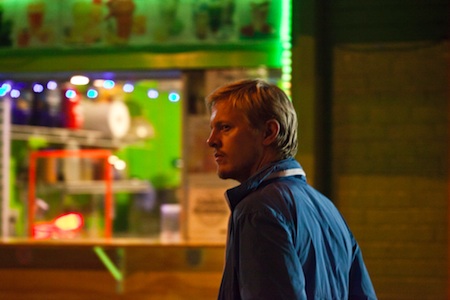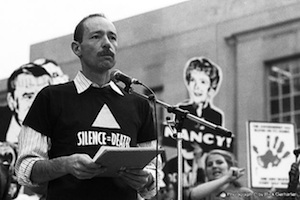With Outfest Los Angeles celebrating its 30th year, it’s hard to imagine that this, one of the most auspicious of all gay and lesbian film festivals, began its life as a spare weekend in a UCLA classroom where Maedchen in Uniform was shown along with some Kenneth Anger shorts and whatever pieces of same-sex-oriented effluvia could be randomly rounded up, all tied together with a panel discussion about what gay and lesbian cinema might be. That’s because 30 years ago Teh Ghey (as we call it in Greater Blogistan ) was slyly gossiped about, furtively dreamed over but largely unseen because “experimental” cinema aside, it was barely present outside of blue moons like The Boys in the Band “tasteful” shockers like The Children’s Hour, and full-press exploitation thrillers like The Detective. Vito Russo‘s The Celluloid Closet went a long way toward both unearthing gay and lesbian cinematic history while demanding better, more accurate and above all less insulting representations of our lives. Today while everyone gossips about Teh Ghey more than ever, furtive dreaming is rapidly becoming a thing of the past as increasingly honest and accurate films and television series about gay and lesbian life are widely available. But just because of Brokeback Mountain, Queer As Folk, Will & Grace, and more recently Glee, and Smash, there’s no reason to assume that all bases have been covered. And that’s where something Outfest comes into the picture—filling in the blanks and expanding the horizon.
Running from July 12-22 primarily at the Directors Guild theaters, but including locations all over greater Los Angeles, Outfest offers a wide assortment of features and shorts dealing with the gay, lesbian, bisexual, and/or transgendered experience, past and present. with daring and insight. Obviously they’re not equally successful. But they are equally sincere. And at their best the films on view here offer access to people and lives the rest of cinema continues to overlook. Opening with Jeffrey Schwarz’s terrific documentary about activist/cineaste Vito Russo, Vito, and closing with actor-screenwriter Chris Colfer’s comedy about getting ahead in high school, Struck By Lightning, Outfest doesn’t so much offer “something for everyone” as it highlights a great many things for those who never thought they would see themselves on screen at all. Just as important Outfest deals with important aspects of LGBT history, this year emphasizing the history of AIDS.
Vito deals with Vito Russo’s entire life, and thus covers his years as a gay activist and film historian. But with the dawning of the AIDS years, the film’s emphasis naturally changes as it shows that even while suffering from the disease himself Russo was able to help inspire a generation to fight: for their health and against widespread government indifference. This is an emotionally overwhelming experience, and I say this not only because being one of Vito’s many compatriots I appear in the film myself. How To Survive a Plague and United in Anger: A History of ACT-UP tell the rest of the story. The former, by filmmaker/activist David France, shows how activist were able to get the attention of the medical establishment in the creation of the new treatments that are keeping the HIV-infected alive in lieu of a still-elusive cure. Jim Hubbard’s United in Anger emphasizes the power of activism itself as it shows how a jeremiad by Larry Kramer sparked ACT-UP, the “AIDS Coalition to Unleash Power,” that has been absolutely pivotal in a people’s fight for their very lives. Consequently both films are essential viewing.
Another striking, and largely related documentary Jobriath A.D., by Kieran Turner, recounts the story of how a small-town boy named Bruce Wayne Campbell came to the big city, changed his name, became part of the original cast of Hair and then was given an incredibly elaborate, wildly unsuccessful launch as a glam rock star by a slick promoter named Jerry Brandt. While David Bowie and Marc Bolan flirted with “bisexual” affectation, Jobriath declared himself “the True Fairy” of rock and roll. But giant posters on billboard and busses didn’t do the trick, making Jobriath both of his time and ahead of his time all at once. Transforming himself yet again after this debacle into a piano lounge singer called “Cole Berlin,” he was doing rather well until AIDS took him. Now decades later, people are starting to give Jobraith the attention he should have had. Actress and performance artist extraordinaire Ann Magnuson will execute a tribute to Jobriath at a July 20 screening.
‘Vito’ deals with Vito Russo’s entire life, and thus covers his years as a gay activist and film historian. But with the dawning of the AIDS years, the film’s emphasis naturally changes as it shows that even while suffering from the disease himself Russo was able to help inspire a generation to fight: for their health and against widespread government indifference. This is an emotionally overwhelming experience, and I say this not only because being one of Vito’s many compatriots I appear in the film myself.
Another trip down memory lane is offered by filmmaker Matthew Mishory in his Joshua Tree, 1951: A Portrait of James Dean. As might be expected, the title says it all. Dean, nicely evoked by actors James Preston, is observed on a desert retreat arranged by producer/keep “Roger” (Edward Singletary), an obvious stand-in for Rogers Brackett, the man who got his then-boyfriend small parts in such films as Fixed Bayonets and Has Anybody Seen My Gal before the breakthrough of East of Eden came along. Veteran out gay actor Rober Gant plays a character called “The Famous Director,” clearly modeled after Nicholas Ray who gives Dean career, and personal, advice. But it’s all about the “look” in a film of this kind which, being in black and white, consistently evokes the softcore homoeroticism redolent of Bruce Weber. It’s good superficial fun.
Emotionally deeper, though sporting a shiny surface too is Wu Tang’s Wildness, a nicely impressionistic study of Latino and Asian transsexual nightlife. Equally experimental, though in an entirely fictional mode is Eli Rarey’s The Famous Joe Project , a feature-length reconfiguration of his 2007 short about the perils of coming out when a nice but naïve youth (Joey Capone) hooks up with an attractive but sinister slickster (Ary Katz).
On a less heated but even more absorbing plane is I Do. Written by Glenn Gaylord from a script by its star David W. Ross, it tells of the dilemma faced by a pleasantly low-key British fellow whose U.S. visa runs out just as his personal life is becoming more complicated than ever, thanks to his close ties to daughter of his late brother. When his lesbian best pal (Jamie-Lynn Sigler of Sopranos fame) offers to marry him, the problem would seem to be solved. But then he falls in love with an American of Spanish descent (Maurice Compte) who is being forced by his own familial circumstances to live in Spain. Bringing this all to a satisfactory resolution involves a number of plot twists. But what impresses overall is the way I Do deals with the life of a gay man quite off the beaten path who’s neither freakish nor square, just singular. Nice supporting turns by the irrepressible Mickey Cottrell and the hunky Mike Manning (of Real World fame) add to the impact.
Still, the film that stands head and shoulders above all those at Outfest (and head and shoulders above all else I have been seen so far this year) is Keep the Lights On. Directed by Ira Sachs from a screenplay co-written with Mauricio Zacharias, it recounts a ten-year off-and-on, compulsive and often wildly destructive love affair between independent filmmaker Erik (Thure Lindhardt) and chic literary editor Paul (Zachary Booth). Not since Patrice Chereau’s Those Who Love Me Can Take the Train has a film looked so intensely at same-sex love, offering a painfully honest appraisal of the fact that that which gives our lives meaning can also destroy it. Making this point even sharper is the casting for Lindhardt’s filmmaker, who would be pegged by most viewers as the bohemian wildman alongside Booth’s button-down urbanite. Yet the latter is a raging crack cocaine addict while the former is as calm a moral center as one has ever seen. The sad but oddly satisfying resolution of this doomed romance makes for one of the most original film finales in many years. Not to be missed under any circumstances whatsoever.
As for the rest, dive in and explore. You’ll doubtless discover something of worlds you never knew.





